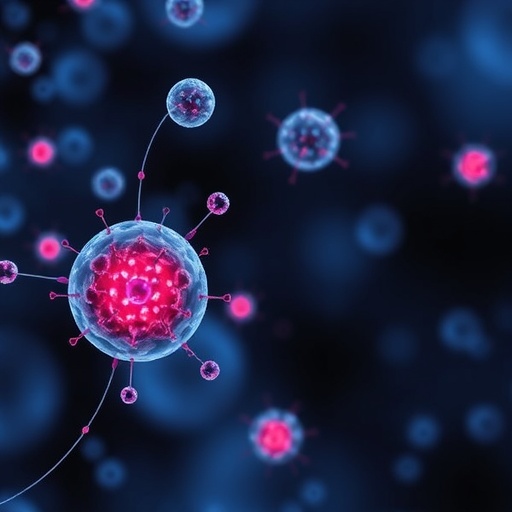In the evolving landscape of cancer treatment, hematopoietic stem cell transplantation (HSCT) has long been recognized as a double-edged sword—a critical, often life-saving procedure shadowed by its considerable physical and psychological toll on patients. While much research has historically focused on the adverse effects of HSCT, a paradigm shift is emerging, aimed at understanding the positive psychological transformations that can follow traumatic medical interventions. This transformative phenomenon is known as post-traumatic growth (PTG), characterized by individuals experiencing profound positive psychological change after confronting severe adversity.
A groundbreaking descriptive survey study conducted in South Korea delves into this scarcely explored territory, dissecting the psychosocial and clinical factors that influence PTG among HSCT recipients. Carried out over four years and encompassing a cohort of 106 adult patients within their first year post-transplantation, this research offers critical insights into how survivors of HSCT might not only recover but potentially experience meaningful psychological growth.
The study is situated in a university hospital in Seoul, where participants were rigorously assessed through structured questionnaires alongside clinical data obtained from electronic medical records. By deploying robust statistical methods—ranging from t-tests and analysis of variance to Pearson’s correlation and multiple regression analysis—the research delineates a complex interplay of variables that nurture or impede post-traumatic growth.
Findings reveal a mean PTG score of 73.75 across the study population, indicating a substantial degree of positive psychological adaptation. Notably, the type of transplant emerged as a significant predictor, with patients receiving autologous transplants—where patients’ own stem cells are used—demonstrating higher levels of PTG compared to those receiving stem cells from related or unrelated donors. This distinction may be reflective of differing immunological challenges or psychological stressors associated with each transplant type, hinting at a nuanced biological-psychological interface in recovery trajectories.
Marital status surfaced as another robust factor impacting PTG, with unmarried individuals exhibiting lower growth scores. This finding aligns with the broader psychological literature underscoring social and emotional support as critical buffers in trauma recovery. Indeed, the study further substantiates the integral role of social support networks, which were independently linked to enhanced PTG outcomes, highlighting a vital area for targeted nursing interventions.
The cognitive processes known as rumination—repetitive thinking focused on the traumatic event—showed a positive correlation with PTG, implying that certain types of reflective rumination may facilitate psychological restructuring and meaning-making post-transplant. This challenges the traditional view of rumination as solely detrimental, suggesting that adaptive forms can catalyze growth by helping patients process their experiences constructively.
Moreover, patients’ perceptions of positive changes following transplantation also influenced their PTG scores. This subjective acknowledgment of growth or improvement is crucial, as it may fuel resilience and motivate patients to engage more fully in rehabilitation and psychosocial support programs.
Together, these factors—marital status, transplant type, rumination, perceived positive changes, and social support—accounted for 53% of the variance in PTG, underscoring a multifactorial and interdependent framework of psychological recovery in HSCT survivors. This level of explained variance is remarkably high for psychosocial research, indicating that these variables play substantial roles in shaping patient outcomes.
The implications of this research are manifold, particularly for oncology nursing practice. Nurses operating in transplantation units are uniquely positioned to assess psychosocial variables systematically, identify patients at risk for poor psychological adjustment, and implement personalized interventions grounded in empirical evidence. Fostering supportive environments that enhance social connections, encouraging adaptive rumination, and facilitating cognitive reframing could profoundly influence recovery trajectories.
This study also challenges healthcare providers to reconceptualize the post-HSCT period, shifting from a predominantly pathology-focused model to an integrative framework that recognizes the potential for positive psychological transformation. Psychological support structures must be embedded within transplantation protocols to harness and amplify PTG potential.
Furthermore, the findings encourage a more individualized approach to post-transplant care, sensitive to the type of transplantation and patients’ unique psychosocial contexts. Tailoring support according to these variables may optimize outcomes, reduce psychological morbidity, and improve quality of life.
As the interface between biological processes and psychological adaptation comes into sharper focus, future research avenues are plentiful. Longitudinal studies will be essential to track the durability of PTG and its interaction with ongoing physical health status. Additionally, expanding study populations beyond a single center and cultural context would enhance the generalizability and cultural sensitivity of PTG frameworks.
In conclusion, this seminal work illuminates a crucial yet underappreciated facet of recovery in hematopoietic stem cell transplantation patients. By elucidating the psychosocial and clinical predictors of post-traumatic growth, the research offers a hopeful narrative—one where trauma can serve as a catalyst for profound psychological development rather than mere suffering. This transformative perspective invites clinicians, nurses, and researchers alike to reimagine how recovery is understood, measured, and cultivated in the lives of cancer survivors.
Subject of Research: Post-traumatic growth and its psychosocial and clinical determinants in hematopoietic stem cell transplantation recipients.
Article Title: Factors affecting post-traumatic growth in hematopoietic stem cell transplantation patients in South Korea: a descriptive survey study.
Article References:
Bae, K., Jo, E. Factors affecting post-traumatic growth in hematopoietic stem cell transplantation patients in South Korea: a descriptive survey study. BMC Cancer 25, 1728 (2025). https://doi.org/10.1186/s12885-025-15109-5
Image Credits: Scienmag.com
DOI: 10.1186/s12885-025-15109-5 (07 November 2025)




